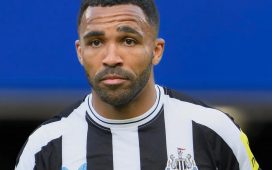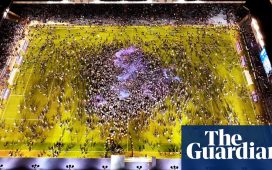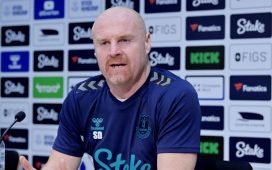L ast Tuesday, as Lionel Messi lashed out at the club’s sporting director, Eric Abidal, the crisis at Barcelona became official. But this is a story about far more than clashing egos and mismanagement at the Camp Nou. It is a parable of modern football, of the problem with genius and the difficulty of identity.
Perhaps the strangest aspect of the saga – sparked by the Argentinian reacting with fury to what he saw as Abidal’s attempt to blame the players for the recent sacking of Ernesto Valverde – is that it has taken so long to reach this point, a reminder that in the modern era super-clubs can be run with staggering ineptitude and still win titles.
The disjointedness of Barça’s team structure has been evident for several years. Again and again, opponents in the knockout stages of the Champions League have rampaged through vast spaces in what should have been the midfield. That’s how Paris Saint-Germain beat them 4-0 in the first leg of their last-16 tie in 2017, and Juventus thumped them 3-0 in the following round. It’s how Roma and Liverpool have been able to overcome three-goal deficits against them, how even an ordinary Chelsea made them look vulnerable at Stamford Bridge in 2018, albeit the game finished 1-1.
A midfield that is variously old, slow and unable to handle the demands of a modern pressing game is the most obvious problem, but it probably isn’t the most troubling. There are two other major issues, both of which cast doubt on core elements of the club’s identity.
The first is Messi. A decade ago, he was a willing worker. He might not have been the most voracious presser, but he did his share. In 2009-10, he regained the ball through tackles or interceptions an average of 2.1 times per game in La Liga. That was an exceptional season but in the years that followed 1.2 or 1.3 was standard. Since Pep Guardiola’s departure, those figures have steadily slipped. Last season he was at 0.5; this season 0.8.

Messi has always been a minimalist genius – indeed part of his greatness has been his capacity consistently to select the lowest difficulty option – but his work rate has declined with time.
That is not necessarily a criticism. It may be that the conservation of energy, his constant low-intensity reconnaissance of the opposition’s defences, is required for him to be so effective at the creative aspects. He is 32 but showing few obvious signs of slowing down in terms of goals or assists. Yet as his genius has papered over the cracks, it is probably also responsible for at least some of those cracks.
This is not about casting blame: brilliance can be problematic. When Juventus’s Argentinian forward Paulo Dybala spoke in the run-up to the 2019 Copa América of his struggles to play with Messi, it was widely reported as a rift between the two, but it could equally have been seen as a statement of fact. It can be hard to play with somebody that good because the temptation to just give him the ball is so strong.
It is not a coincidence that Barcelona have begun to face similar problems to Argentina. And it is not just on the pitch that Messi’s aura creates imbalances. It is almost impossible for him not to be indulged: which coach would ever drop him, let alone sell him? It’s not just about the political consequences of potentially ostracising him, it is that at any moment in any game, he might suddenly beat four men and lash a shot into the corner and so transform a poor result into a good one. But no player should also be a de facto sporting director.
What has exaggerated the problem, with Barcelona and Argentina, is the near total absence of rational leadership. Neither club nor federation, seemingly, has either vision or a plan. That is an issue exacerbated at Barça by the unusual nature of the club and by the difficulty of replacing a coach as extreme and idiosyncratic as Guardiola.
Of all Zlatan Ibrahimovic’s many criticisms of Guardiola, the line that remains the most memorable is his description of Barcelona’s players as schoolboys, standing head bowed before the teacher. It was a sneer that contained a deeper truth: what happens when the teacher leaves? What does a class used to obedience to an extremely prescriptive leader, a class that had found it hard to accommodate outsiders, do then?
This is the issue for any club that has a clearly defined sense of how it should play once the architect of that style has departed, but it is perhaps particularly acute at Barcelona, where a post-Cruyffian style has become intertwined with Catalan self-identity.
Luis Enrique offered a solution of sorts, grafting a celebrity trident on to the side that brought the 2015 Champions League while shifting away from the strictest definition of Guardiola’s philosophy. But Luis Suárez is ageing and injured, while Neymar left to pursue his own ambition, a huge transfer that should have allowed Barça to reconstruct their defence and midfield, but instead led to a pair of vain nine-figure splurges on glamour. The greatest effect of the Neymar deal, as it turned out, was to gift Liverpool the Philippe Coutinho windfall they used to become the best side in the world.
So what do Barça do now? Spend more, but this time on the right players? Or try to return to some system of pure guardiolismo?
Quique Setién’s possession-driven approach already feels slightly archaic. Devotion to an ideal is never in itself a solution. Brilliant as he is, Guardiola was fortunate at Barça to inherit a squad that included seven high-class players brought up at the club academy who understood his philosophy perfectly and to do so at a time when various changes in the game’s laws and economics had made the world receptive to his revolution.
But football has moved on. High pressing and transitions reign. Even Guardiola has evolved. Meanwhile, Barcelona, devoid of leadership, stagnate, sustained only by Messi and their wealth, as the game flows ever further away from them.














